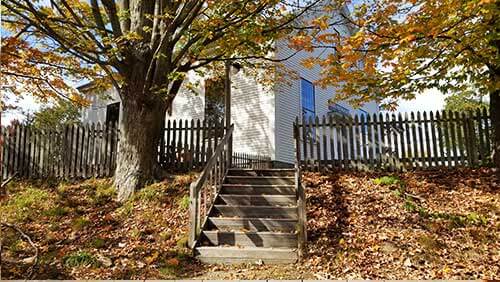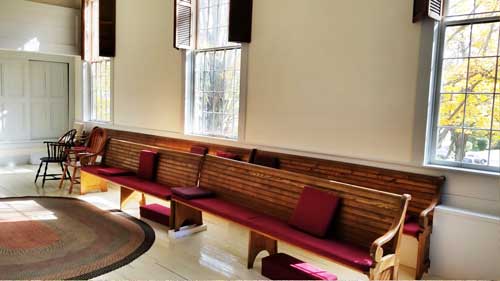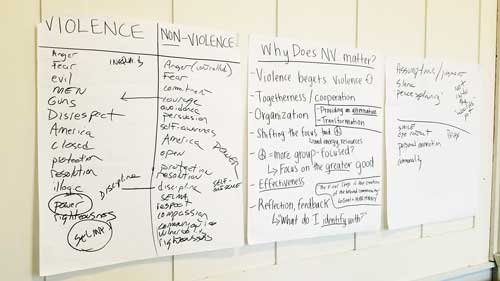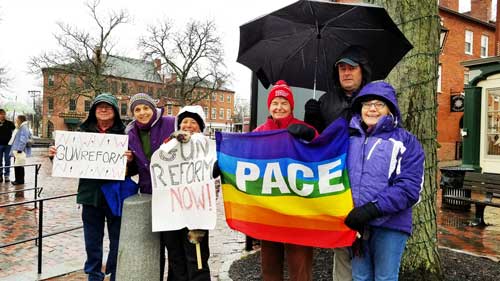All About Quakerism
Friends’ Beliefs
Traditionally, the belief most commonly held among Friends, is that “there is that of God in everyone.”
This can mean something a little different for each person, but the essence is that each of us can experience direct contact with the Divine without a human intermediary, doctrine, or creed.
Quakers have no required beliefs. And while many of us strive to be instruments of God’s will by allowing ourselves to seek and follow the leadings of Spirit, each of us discerns how we live our lives and share our individual gifts for ministering to others. We strive to embody our faith, not merely proclaim it.
Deeply related, is one of our most commonly held values – being of Service. Rufus M. Jones expressed this well in 1937, “Our mission of service is (the means) by which we express ourselves to the world.”
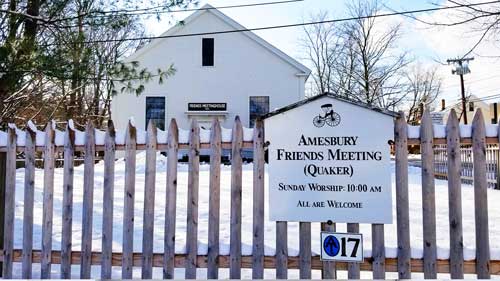
During worship we wait…
opening ourselves to the presence of the Light Within.
“…the testimonies grow out of our inward religious experience and are intended to give outward expression to the leading of the Spirit of God within….”
-Wilmer Cooper, The Testimony of Integrity in the Religous Society of Friends. Pendle Hill Pamphlet (1991)
New England Yearly Meeting’s FAQ
page about the testimonies:
“they may have a place in teaching and describes some broad categories into which our beliefs find expression; however, they may more accurately be called witness. Our one Testimony is to the transforming power of God at work in our lives.”
“We are living testimonies of God being alive on our earth.”
– Minga Claggett-Borne
Background of the Quaker Faith
from Faith & Practice of New England Yearly Meeting, 1988\5, p. 53
George Fox, one of the early founders of the Society of Friends in seventeenth-century England, had as a youth suffered great anguish as he sought an answer to his spiritual quest. His answer came, after much reading of the Scriptures and visits to many ministers and counselors, when he heard a voice within him which said: “There is One, even Christ Jesus, that can speak to thy condition.” “And when I heard it,” he later reported, “my heart did leap for joy.”
He had found God directly without the aid of ritual or clergy, and henceforth his distinctive message was: Christ speaks directly to each human heart who seeks Him; listen to the teacher within; He placed His light within each of us, and as we follow the way He directs we shall be led into life and Truth.
The first names for the new movement were children of the Light and Friends of Truth. William Penn thought of it as “primitive Christianity revived.” Since those early beginnings, Friends have continued to hold that their faith is one of first-hand experience of God in their lives. Spiritual life, they say, does not depend upon the acceptance of certain doctrines, nor the observance of certain rites, but comes as persons are obedient to the light of Christ within them.
They feel free to reject much of the ecclesiastical structure of the times, including priests, church dogmas, outward sacraments, and external authority in religion because they feel that for them these do not serve the life of the spirit. This has not been a solitary faith.
From the beginning, the Quaker faith has flourished in a group, in a society, in a beloved fellowship. While God may be found in one’s inmost life, one is always conscious of being part of a larger group of persons who are likewise joyously following the inward way and seeking to be obedient to the light of Christ within.
They seek to be obedient not only in the quiet gathering for worship together, or in their meeting for settling practical affairs, but also as they are led as a group to be concerned for those about them, particularly those suffering injustices or inequities. While Friends had great respect for the individual person, the real unit in the Society of Friends has always been the Meeting.
Friends traditionally allow great freedom in describing their own religious life and experience. They have no formal creed. They try to weave their faith into life.
Are they seriously trying to follow their inward guide? Does the Sermon on the Mount come alive for them as setting standards for Christian action? Are they endeavoring to live by Quaker testimonies of integrity, simplicity, equality, peace, and community? In other words, one can often tell Quakers not so much by what they say as by the way they live.
